- Home
- Lemony Snicket
The Slippery Slope asoue-10 Page 16
The Slippery Slope asoue-10 Read online
Page 16
"You'll be like the daughter we never had," Esmé said, stroking her tiara.
"Or something," added Olaf, who looked like he would prefer having another employee rather than a daughter.
Carmelita glanced once more at the Baudelaires, and then smiled up at the two villains. "Do you really think I'm adorable?" she asked.
"I think you're adorable, beautiful, cute, dainty, eye-pleasing, flawless, gorgeous, harmonious, impeccable, jaw-droppingly adorable, keen, luscious, magnificent, nifty, obviously adorable, photogenic, quite adorable, ravishing, splendid, thin, undeformed, very adorable, well-proportioned, xylophone, yummy, and zestfully adorable," Esmé pledged, "every morning, every afternoon, every night, and all day long!"
"Don't listen to her!" Quigley pleaded. "A person can't be 'xylophone'!"
"I don't care!" Carmelita said. "I'm going to push these cakesniffers off the mountain, and start an exciting and fashionable new life!"
The Baudelaires took another step back, and Quigley followed, giving the children a panicked look. Above them they could hear the squawking of the eagles as they took the villains' new recruits farther and farther away. Behind them they could feel the four drafts of the valley below, where the headquarters had been destroyed by people the children's parents had devoted their lives to stopping. Violet reached in her pocket for her ribbon, trying to imagine what she could invent that could get them away from such villainous people, and journeying toward their fellow volunteers at the last safe place. Her fingers brushed against the bread knife, and she wondered if she should remove the weapon from her pocket and use it to threaten the villains with violence, or whether this, too, would make her as villainous as the man who was staring at her now.
"Poor Baudelaires," Count Olaf said mockingly. "You might as well give up. You're hopelessly outnumbered."
"We're not outnumbered at all," Klaus said. "There are four of us, and only three of you."
"I count triple because I'm the False Spring Queen," Carmelita said, "so you are outnumbered, cakesniffers."
This, of course, was more utter nonsense from the mouth of this cruel girl, but even if it weren't nonsense, it does not always matter if one is outnumbered or not. When Violet and Klaus were hiking toward the Valley of Four Drafts, for instance, they were outnumbered by the swarm of snow gnats, but they managed to find Quigley Quagmire, climb up the Vertical Flame Diversion to the headquarters, and find the message hidden in the refrigerator. Sunny had been outnumbered by all of the villains on top of Mount Fraught, and had still managed to survive the experience, discover the location of the last safe place, and concoct a few recipes that were as easy as they were delicious. And the members of V.F.D. have always been outnumbered, because the number of greedy and wicked people always seems to be increasing, while more and more libraries go up in smoke, but the volunteers have managed to endure, a word which here means "meet in secret, communicate in code, and gather crucial evidence to foil the schemes of their enemies." It does not always matter whether there are more people on your side of the schism than there are on the opposite side, and as the Baudelaires stood with Quigley and took one more step back, they knew what was more important.
"Rosebud!'' Sunny cried, which meant "In some situations, the location of a certain object can be much more important than being outnumbered," and it was true. As the villains gasped in astonishment, Violet sat down in the toboggan, grabbing the leather straps. Quigley sat down behind her and put his arms around her waist, and Klaus sat down next, and put his arms around Quigley's, and there was just enough room in back for a young girl, so Sunny sat behind her brother and hung on tight as Violet pushed off from the peak of Mount Fraught and sent the four children hurtling down the slope. It did not matter that they were outnumbered. It only mattered that they could escape from a monstrous end by racing down the last of the slippery slope, just as it only matters for you to escape from a monstrous end by putting down the last of The Slippery Slope, and reading a book in which villains do not roar at children who are trying to escape.
"We'll be right behind you, Baudelaires!" Count Olaf roared, as the toboggan raced toward the Valley of Four Drafts, bumping and splashing against the cracked and melting ice.
"He won't be right behind us," Violet said. "My shoes punctured his tire, remember?"
Quigley nodded. "And he'll have to take that path," he said. "A car can't go down a waterfall."
"We'll have a head start," Violet said. "Maybe we can reach the last safe place before he does."
"Overhear!" Sunny cried. "Hotel Denouement!"
"Good work, Sunny!" Violet said proudly, pulling on the leather straps to steer the toboggan away from the large crack. "I knew you'd be a good spy."
"Hotel Denouement," Quigley said. "I think I have that in one of my maps. I'll check my commonplace book when we get to the bottom."
"Bruce!" Sunny cried.
"That's another thing to write down in our commonplace books," Klaus agreed. "That man Bruce was at Dr. Montgomery's house at the end of our stay. He said he was packing up Monty's reptile collection for the herpetological society."
"Do you think he's really a member of V.F.D.?" Violet asked.
"We can't be sure," Quigley said. "We've managed to investigate so many mysteries, and yet there's still so much we don't know." He sighed thoughtfully, and gazed down at the ruins of headquarters rushing toward them. "My siblings — "
But the Baudelaires never got to hear any more about Quigley's siblings, because at that moment the toboggan, despite Violet's efforts with the leather straps, slipped against a melted section of the waterfall, and the large sled began to spin. The children screamed, and Violet grabbed the straps as hard as she could, only to have them break in her hands. "The steering mechanism is broken!" she yelled. "Dragging Esmé Squalor up the slope must have weakened the straps!"
"Uh-oh!" Sunny cried, which meant something along the lines of, "That doesn't sound like good news."
"At this velocity," Violet said, using a scientific word for speed, "the toboggan won't stop when we reach the frozen pool. If we don't slow down, we'll fall right into the pit we dug."
Klaus was getting dizzy from all the spinning, and closed his eyes behind his glasses. "What can we do?" he asked.
"Drag your shoes against the ice!" Violet cried. "The forks should slow us down!"
Quickly, the two elder Baudelaires stretched out their legs and dragged the forks of their shoes against the last of the ice on the slope. Quigley followed suit, but Sunny, who of course was not wearing fork-assisted climbing shoes, could do nothing but listen to the scraping and splashing of the forks against the thawing ice of the stream as the toboggan slowed ever so slightly.
"It's not enough!" Klaus cried. As the toboggan continued to spin, he caught brief glimpses of the pit they had dug, covered with a thin layer of weakened wood, getting closer and closer as the four children hurtled toward the bottom of the waterfall.
"Bicuspid?" Sunny asked, which meant something like "Should I drag my teeth against the ice, too?"
"It's worth a try," Klaus said, but as soon as the youngest Baudelaire leaned down and dragged her teeth along the thawing waterfall, the Baudelaires could see at once that it was not really worth a try at all, as the toboggan kept spinning and racing toward the bottom.
"That's not enough, either," Violet said, and focused her inventing mind as hard as she could, remembering how she had stopped the caravan, when she and her brother were hurtling away from Count Olaf's automobile. There was nothing large enough to use as a drag chute, and the eldest Baudelaire found herself wishing that Esmé Squalor were on board with them, so she could stop the toboggan with her enormous, flame-imitating dress. She knew there was no blackstrap molasses, wild clover honey, corn syrup, aged balsamic vinegar, apple butter, strawberry jam, caramel sauce, maple syrup, butterscotch topping, maraschino liqueur, virgin and extra-virgin olive oil, lemon curd, dried apricots, mango chutney, crema di noci, tamarind paste, hot mustard, m
arshmallows, creamed corn, peanut butter, grape preserves, salt water taffy, condensed milk, pumpkin pie filling, or glue on board, or any other sticky substance, for that matter. But then she remembered the small table she had used to drag on the ground, behind the caravan, and she reached into her pocket and knew what she could do.
"Hang on!" Violet cried, but she did not hang on herself. Dropping the broken straps of the toboggan, she grabbed the long bread knife and took it out of her pocket at last. It had only been several days, but it felt like a very long time since she had taken the knife from the caravan, and it seemed that every few minutes she had felt its jagged blade in her pocket as she tried to defeat the villains high above her, without becoming a villain herself. But now, at last, there was something she could do with the knife that might save them all, without hurting anyone. Gritting her teeth, Violet leaned out of the spinning toboggan and thrust the knife as hard as she could into the ice of the slippery slope.
The tip of the blade hit the crack caused by Carmelita's Springpole, and then the entire knife sank into the slope just as the toboggan reached the bottom. There was a sound the likes of which the Baudelaires had never heard, like a combination of an enormous window shattering and the deep, booming sound of someone firing a cannon. The knife had widened the crack, and in one tremendous crash, the last of the ice fell to pieces and all of the forks, sunlight, teeth, and tobogganing finally took their toll on the waterfall. In one enormous whoosh! the waters of the Stricken Stream came rushing down the slope, and in a moment the Baudelaires were no longer on a frozen pool at the bottom of a strange curve of ice, but simply at the bottom of a rushing waterfall, with gallons and gallons of water pouring down on them. The orphans had just enough time to take a deep breath before the toboggan was forced underwater. The three siblings hung on tight, but the eldest Baudelaire felt a pair of hands slip from her waist, and when the wooden toboggan bobbed to the surface again, she called out the name of her lost friend.
"Quigley!" she screamed.
"Violet!" The Baudelaires heard the triplet's voice as the toboggan began to float down one of the tributaries. Klaus pointed, and through the rush of the waterfall the children could see a glimpse of their friend. He had managed to grab onto a piece of wood from the ruins of headquarters, something that looked a bit like a banister, such as one might need to walk up a narrow staircase leading to an astronomical observatory. The rush of the water was dragging the wood, and Quigley, down the opposite tributary of the Stricken Stream.
"Quigley!" Violet screamed again.
"Violet!" Quigley shouted, over the roar of the water. The siblings could see he had removed his commonplace book from his pocket and was desperately waving it at them. "Wait for me! Wait for me at — "
But the Baudelaires heard no more. The Stricken Stream, in its sudden thaw from the arrival of False Spring, whisked the banister and the toboggan away from one another, down the two separate tributaries. The siblings had one last glimpse of the notebook's dark purple cover before Quigley rushed around one twist in the stream, and the Baudelaires rushed around another, and the triplet was gone from their sight.
"Quigley!" Violet called, one more time, and tears sprung in her eyes.
"He's alive," Klaus said, and held Violet's shoulder to help her balance on the bobbing toboggan. She could not tell if the middle Baudelaire was crying, too, or if his face was just wet from the waterfall. "He's alive, and that's the important thing."
"Intrepid," Sunny said, which meant something like, "Quigley Quagmire was brave and resourceful enough to survive the fire that destroyed his home, and I'm sure he'll survive this, too."
Violet could not bear that her friend was rushing away from her, so soon after first making his acquaintance. "But we're supposed to wait for him," she said, "and we don't know where."
"Maybe he's going to try to reach his siblings before the eagles do," Klaus said, "but we don't know where they are."
"Hotel Denouement?" Sunny guessed. "V.F.D.?"
"Klaus," Violet said, "you saw some of Quigley's research. Do you know if these two tributaries ever meet up again?"
Klaus shook his head. "I don't know," he said. "Quigley's the cartographer."
"Godot," Sunny said, which meant "We don't know where to go, and we don't know how to get there."
"We know some things," Klaus said. "We know that someone sent a message to J.S."
"Jacques," Sunny said.
Klaus nodded. "And we know that the message said to meet on Thursday at the last safe place."
"Matahari," Sunny said, and Klaus smiled, and pulled Sunny toward him so she wouldn't fall off the floating toboggan. She was no longer a baby, but the youngest Baudelaire was still young enough to sit on her brother's lap.
"Yes," Klaus agreed. "Thanks to you, we know that the last safe place is the Hotel Denouement."
"But we don't know where that is," Violet said. "We don't know where to find these volunteers, or if indeed there are any more surviving members of V.F.D. We can't even be certain what V.F.D. stands for, or if our parents are truly dead. Quigley was right. We've managed to investigate so many mysteries, and yet there's still so much we don't know."
Her siblings nodded sadly, and if I had been there at that moment, instead of arriving far too late to see the Baudelaires, I would have nodded, too. Even for an author like myself, who has dedicated his entire life to investigating the mysteries that surround the Baudelaire case, there is still much I have been unable to discover. I do not know, for instance, what happened to the two white-faced women who decided to quit Olaf's troupe and walk away, all by themselves, down the Mortmain Mountains. There are some who say that they still paint their faces white, and can be seen singing sad songs in some of the gloomiest music halls in the city. There are some who say that they live together in the hinterlands, attempting to grow rhubarb in the dry and barren ground. And there are those who say that they did not survive the trip down from Mount Fraught, and that their bones can be found in one of the many caves in the odd, square peaks. But although I have sat through song after dreary song, and tasted some of the worst rhubarb in my life, and brought bone after bone to a skeleton expert until she told me that I was making her so miserable that I should never return, I have not been able to discover what truly happened to the two women. I do not know where the remains of the caravan are, as I have told you, and as I reach the end of the rhyming dictionary, and read the short list of words that rhyme with "zucchini," I am beginning to think I should stop my search for the destroyed vehicle and give up that particular part of my research. And I have not tracked down the refrigerator in which the Baudelaires found the Verbal Fridge Dialogue, despite stories that it is also in one of the Mortmain Mountain caves, or performing in some of the gloomiest music halls in the city.
But even though there is much I do not know, there are a few mysteries that I have solved for certain, and one thing I am sure about is where the Baudelaire orphans went next, as the ashen waters of the Stricken Stream hurried their toboggan out of the Mortmain Mountains, just as the sugar bowl was hurried along, after the volunteer tossed it into the stream to save it from the fire. But although I know exactly where the Baudelaires went, and can even trace their path on a map drawn by one of the most promising young cartographers of our time, I am not the writer who can describe it best. The writer who can most accurately and elegantly describe the path of the three orphans was an associate of mine who, like the man who wrote "The Road Less Traveled," is now dead. Before he died, however, he was widely regarded as a very good poet, although some people think his writings about religion were a little too mean-spirited. His name was Algernon Charles Swinburne, and the last quatrain of the eleventh stanza of his poem "The Garden of Proserpine" perfectly describes what the children found as this chapter in their story drew to an end, and the next one began. The first half of the quatrain reads, That no life lives forever; That dead men rise up never; and indeed, the grown men in the Baudelaires' lives who were dea
d, such as Jacques Snicket, or the children's father, were never going to rise up. And the second half of the quatrain reads, < i>That even the weariest river Winds somewhere safe to sea.
This part is a bit trickier, because some poems are a bit like secret codes, in that you must study them carefully in order to discover their meaning. A poet such as Quigley Quagmire's sister, Isadora, of course, would know at once what those two lines mean, but it took me quite some time before I decoded them. Eventually, however, it became clear that "the weariest river" refers to the Stricken Stream, which indeed seemed weary from carrying away all of the ashes from the destruction of
V.F.D. headquarters, and that "winds somewhere safe to sea" refers to the last safe place where all the volunteers, including Quigley Quagmire, could gather. As Sunny said, she and her siblings did not know where to go, and they didn't know how to get there, but the Baudelaire orphans were winding there anyway, and that is one thing I know for certain.
About the Author
Until recently, LEMONY SNICKET was presumed to be "presumed dead." Instead, this "presumed" presumption wasn't disproved to not be incorrect. As he continues with his investigation, interest in the Baudelaire case has increased. So has his horror.
BRETT HELQUIST was born in Ganado, Arizona, grew up in Orem, Utah, and now lives in Brooklyn, New York. He earned a bachelor's degree in fine arts from Brigham Young University and has been illustrating ever since. His work deciphering the evidence provided by Lemony Snicket into pictures often leaves him so distraught that he is awake late into the night.
To My Kind Editor,
I apologize for the watery quality of this letter but I'm afraid the ink I am using has become diluted, a word which here means "soaked with salt water from the ocean and from the author's own tears. It is difficult to conduct my investigation on the damaged submarine where the Baudelaires lived during the episode of their lives, and I can only hope that the rest of this letter will not wash away.

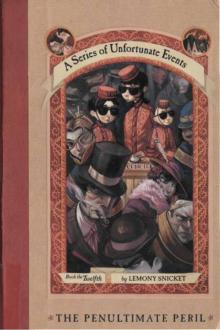 The Penultimate Peril
The Penultimate Peril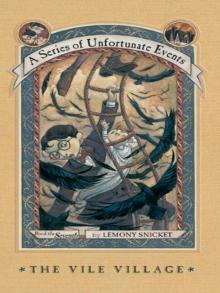 The Vile Village
The Vile Village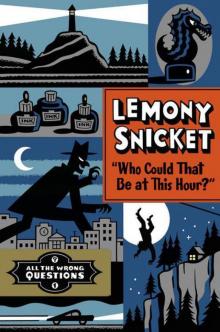 Who Could That Be at This Hour?
Who Could That Be at This Hour?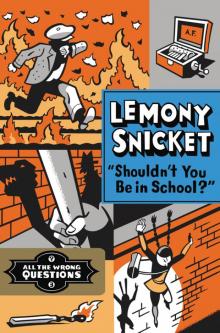 Shouldn't You Be in School?
Shouldn't You Be in School?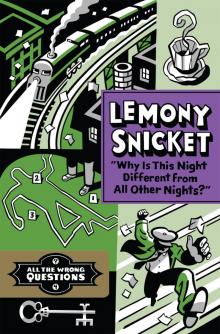 Why Is This Night Different From All Other Nights?
Why Is This Night Different From All Other Nights?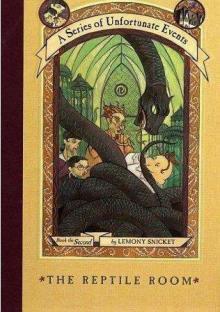 The Reptile Room
The Reptile Room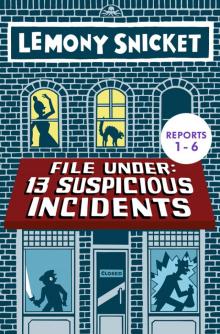 File Under: 13 Suspicious Incidents (1-6)
File Under: 13 Suspicious Incidents (1-6) The End
The End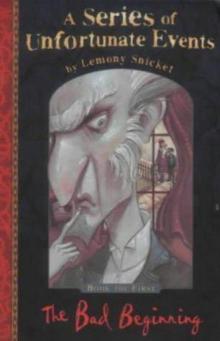 The Bad Beginning
The Bad Beginning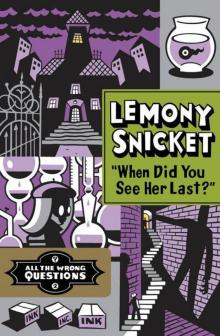 When Did You See Her Last?
When Did You See Her Last?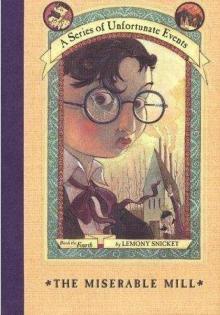 The Miserable Mill
The Miserable Mill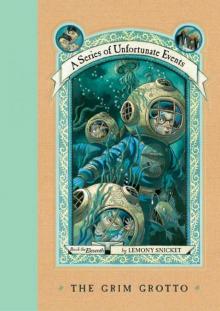 The Grim Grotto
The Grim Grotto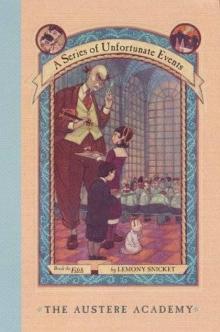 The Austere Academy
The Austere Academy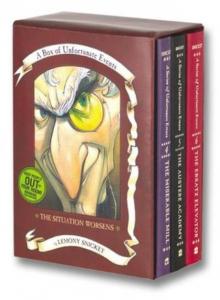 The Ersatz Elevator
The Ersatz Elevator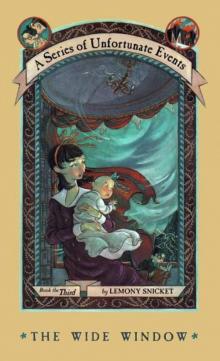 The Wide Window
The Wide Window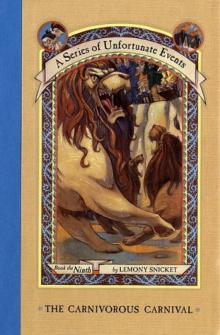 The Carnivorous Carnival
The Carnivorous Carnival A Series of Unfortunate Events Box: The Complete Wreck
A Series of Unfortunate Events Box: The Complete Wreck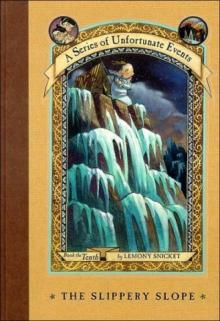 The Slippery Slope
The Slippery Slope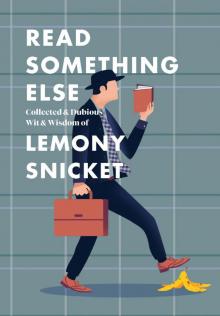 Read Something Else
Read Something Else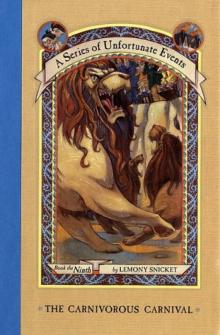 The Carnivorous Carnival asoue-9
The Carnivorous Carnival asoue-9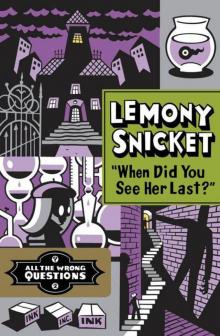 When Did You See Her Last
When Did You See Her Last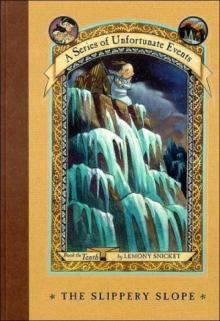 The Slippery Slope asoue-10
The Slippery Slope asoue-10 The Hostile Hospital asoue-8
The Hostile Hospital asoue-8 A Series of Unfortunate Events Collection: Books 1-13 with Bonus Material
A Series of Unfortunate Events Collection: Books 1-13 with Bonus Material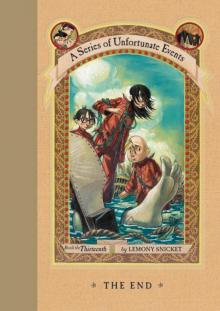 The End asoue-13
The End asoue-13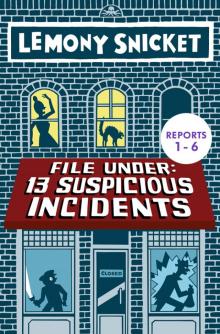 File Under
File Under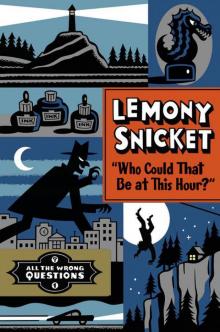 Who Could That Be at This Hour? (All the Wrong Questions)
Who Could That Be at This Hour? (All the Wrong Questions)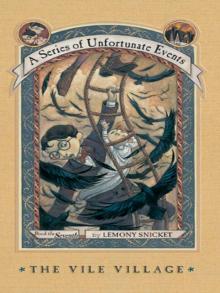 The Vile Village asoue-7
The Vile Village asoue-7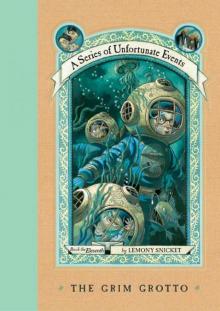 The Grim Grotto asoue-11
The Grim Grotto asoue-11